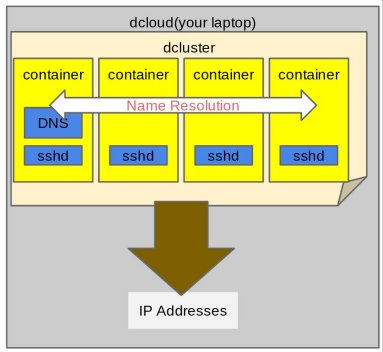dcloud is a tool to orchestrate Docker containers.
Currently Centos65, Redhat65 and Ubuntu13 are supported.
MacOS is NOT suported
python version 2.6.6 is recommended. There seems ways to accomplish this. Here is some idea...
add-apt-repository ppa:fkrull/deadsnakes
sudo apt-get update
sudo apt-get install python2.6 python2.6-dev
cd /usr/bin
ln -s python2.6 python
yum -y install gcc python-devel gmp-devel bash-completion
wget --no-check-certificate https://raw.github.com/pypa/pip/master/contrib/get-pip.py
python get-pip.py
# yum -y install python-crypto
pip install pycrypto
pip install paramiko
easy_install --upgrade ecdsa
If you are using Debian
apt-get install gcc
apt-get install python-dev
Refer to the Docker Installation document. Currently version 0.11.1 is recommended
https://www.docker.io/gettingstarted/#h_installation
This is a handy unofficial note for Docker installation on Centos. Please refer to the Docker official page for detail.
sudo yum install http://dl.fedoraproject.org/pub/epel/6/x86_64/epel-release-6-8.noarch.rpm
sudo yum update -y
sudo yum -y install docker-io
sudo service docker start
git clone <dcloud source path>
sudo python setup.py install --record installedFiles.txtcat installedFiles.txt | sudo xargs rm -rf
Please note that you run dcloud command as root user at this point. We have a ticket to fix this limitation vmware-archive/dcloud#2
$ cat example/cluster_from_images.json
{
"id" : "example_cluster1",
"domain" : "mydomain.com",
"dns" : ["8.8.8.8", "8.8.4.4"],
"nodes": [
{
"hostname" : "node[1..3]",
"imageName" : "dcloud/ssh-base",
"cmd" : "service sshd start && tail -f /var/log/yum.log"
}
]
}
$ dcloud create example/cluster_from_images.json
$ cat example/cluster_from_Dockerfile/cluster_from_Dockerfile.json
{
"id" : "example_cluster2",
"domain" : "mydomain.com",
"dns" : ["8.8.8.8", "8.8.4.4"],
"nodes": [
{
"hostname" : "node[1..2]",
"Dockerfile" : "example/cluster_from_Dockerfile/.",
"cmd" : "service sshd start && service httpd start && tail -f /var/log/yum.log"
}
]
}
$ cat example/cluster_from_Dockerfile/Dockerfile
FROM centos
RUN echo root:changeme | chpasswd
RUN yum -y install httpd
RUN yum -y install openssh-server openssh-clients
$ dcloud create example/cluster_from_Dockerfile/cluster_from_Dockerfile.json
dcloud list
dcloud list example_cluster1
dcloud destroy example_cluster1
dcloud snapshot example_cluster1 phd
TODO Fix this.
dcloud archive example_cluster1
ls -laFh /tmp/dcloud_work/
md5
nosetests test
Currently dcloud assumes network access to the containers. This will not work for macs, so a simpler solution is given for mac support: dcloud inside docker.
To get this running, run the following
docker run -t -i --privileged dcloud/dcloud:0.2
This will Mac users to run a Docker image from docker.io that contains dcloud, open up a bash shell and run dcloud.
Update docs once the pivotal namespace has been registered with docker registry and a dcloud image is hosted there.
This section talks about how to make dcloud distributable artifacts. Currently we have only one option, docker image.
The provided Makefile supports building docker images under any namespace provided
NAMESPACE=mynamespacehere make --environment-overrides docker-build
The above example will create a docker image named mynamespacehere/dcloud:0.2
docker login
then
make docker-push
or
make docker-release # which will build images and push to docker.io
